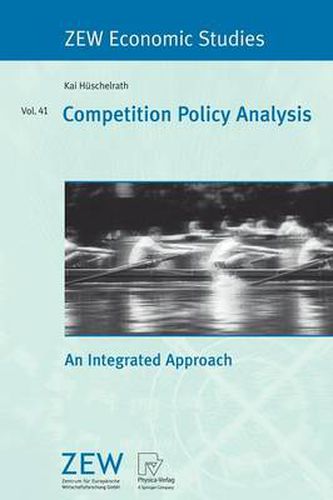Readings Newsletter
Become a Readings Member to make your shopping experience even easier.
Sign in or sign up for free!
You’re not far away from qualifying for FREE standard shipping within Australia
You’ve qualified for FREE standard shipping within Australia
The cart is loading…






This title is printed to order. This book may have been self-published. If so, we cannot guarantee the quality of the content. In the main most books will have gone through the editing process however some may not. We therefore suggest that you be aware of this before ordering this book. If in doubt check either the author or publisher’s details as we are unable to accept any returns unless they are faulty. Please contact us if you have any questions.
Competition policy is an integral and prominent part of economic policy-making in the European Union. The EU Treaty prescribes its member states to conduct economic policy ‘in accordance with the principle of an open market economy with free competition’. More precisely, the goal of EU competition policy is to defend and develop effective competition in the common market (European Commission, 2000: 7). Under its Commissioners van Miert, Monti and, most - cently, Kroes the EU Commission has stepped up its effort to pursue and achieve the aforementioned goal. A number of so-called hard-core cartels, such as the - torious vitamin cartel led by Roche, have been detected, tried in violation of Art. 81 of the Maastricht Accord and punished with severe fines. Also Microsoft was hit hard by the strong hand of the Commission having been severely fined for - ploiting a dominant market position. Economic analysis has been playing an increasingly significant role in the Commission’s examination of competition law cases. This holds true in particular for merger control. Here, however, the Commission has had to accept some poi- ant defeats in court, such as the Court’s reversals of Airtours-First Choice or GE- Honeywell. Among other things, the European Court of Justice found the e- nomic analysis as conducted by the EU’s Directorate General for Competition to be flawed and the conclusions drawn not to be convincing. These rejections by the courts have stirred up the scholarly debate on the conceptual foundations of Eu- pean competition policy.
$9.00 standard shipping within Australia
FREE standard shipping within Australia for orders over $100.00
Express & International shipping calculated at checkout
This title is printed to order. This book may have been self-published. If so, we cannot guarantee the quality of the content. In the main most books will have gone through the editing process however some may not. We therefore suggest that you be aware of this before ordering this book. If in doubt check either the author or publisher’s details as we are unable to accept any returns unless they are faulty. Please contact us if you have any questions.
Competition policy is an integral and prominent part of economic policy-making in the European Union. The EU Treaty prescribes its member states to conduct economic policy ‘in accordance with the principle of an open market economy with free competition’. More precisely, the goal of EU competition policy is to defend and develop effective competition in the common market (European Commission, 2000: 7). Under its Commissioners van Miert, Monti and, most - cently, Kroes the EU Commission has stepped up its effort to pursue and achieve the aforementioned goal. A number of so-called hard-core cartels, such as the - torious vitamin cartel led by Roche, have been detected, tried in violation of Art. 81 of the Maastricht Accord and punished with severe fines. Also Microsoft was hit hard by the strong hand of the Commission having been severely fined for - ploiting a dominant market position. Economic analysis has been playing an increasingly significant role in the Commission’s examination of competition law cases. This holds true in particular for merger control. Here, however, the Commission has had to accept some poi- ant defeats in court, such as the Court’s reversals of Airtours-First Choice or GE- Honeywell. Among other things, the European Court of Justice found the e- nomic analysis as conducted by the EU’s Directorate General for Competition to be flawed and the conclusions drawn not to be convincing. These rejections by the courts have stirred up the scholarly debate on the conceptual foundations of Eu- pean competition policy.